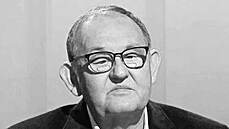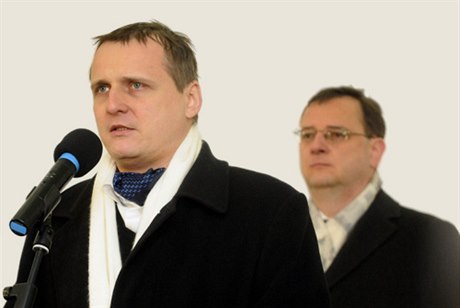The patient — the coalition government — suffered the first attack last December when ODS Environment Ministr Pavel Drobil (Civic Democrats, ODS) was forced to resign, the second in April over de facto Public Affairs (VV) leader Vít Bárta’s “cash for loyalty” payments and the third May 11 when VV leader and deputy Prime Minister Radek John announced his resignation from the government. It doesn’t take a doctor to realize that the interval between attacks is getting dangerously short.
If it weren’t for the miraculous doctor at Prague Castle — President Václav Klaus— who at critical moments for the governing coalition steps in for the weak Prime Minister Petr Nečas (ODS), this poor government would have already expired. As it is, it is suffering, as indeed are the voters, to whom it promised reforms and other restorative therapies that, being so sick, it has no strength to administer.
Unsustainable situation
The original lower house majority of 118, now reduced to 115 parliamentary deputies after the expulsion of three “traitors,” is no use to Nečas’ government since the center-right coalition of ODS, TOP 09 and VV is a motley partnership comprising two regular political parties and one grouping that is difficult to identify. If we add to this “genetic defect” of the coalition, mutual suspicion, insufficient loyalty, and last but not least a feature specific to the Czech political scene over almost the last 20 years: the belief that politics is about combat and not the search for consensus (at the cost of comprise, it goes without saying), then the chronic crises of the current government should come as no surprise. John did not inform Nečas in advance of his plan to resign, though two hours later he was received upon his own request by President Klaus.
John told journalists after he announced his resignation that he lacked tangible support from Prime Minister Nečas in the fight against corruption. He called the current situation unsustainable and said he was convinced that “the current Cabinet cannot push through reforms and explain their importance to the general public without further changes being made.”
John did not inform Nečas in advance of his plan to resign, though two hours later he was received upon his own request by President Klaus, in whom VV places great trust. As indeed it should. It was Klaus who initially refused to accept de facto party leader Bárta’s resignation as transport minister and John’s recall from the Ministry of the Interior during April’s crisis.
And he even frustrated Nečas’ plan to remove Minister of Education Josef Dobeš (VV) from the government. The same Dobeš who incidentally employs Ladislav Bátora as his adviser, who is that special kind of nationalist much favored by the Castle. Will Klaus out-maneuver Nečas this time, too, if the PM fails to consolidate the coalition in some shape or form?
Without respect and authority
This will be extremely difficult for Nečas to pull off, since he lacks respect and authority within the coalition. For instance, he promised Deputy Prime Minister John he would establish a government commission on the fight against corruption, only to inexplicably humble VV by publicly forbidding John from employing Michal Moroz, a former deputy minister at the Ministry of the Interior, and Libor Michálek, the corruption whistle-blower and former head of the State Environmental Fund (SFŽP). And as though this weren’t humiliating enough. ...
On May 7 Nečas gave an interview to the daily Mladá fronta Dnes (MfD) stating that merely thinking about government changes had actually wrought changes, that the tempo and performance of certain colleagues had improved, and that for this reason he regarded the government’s attempts at reform as being far more important than any possible personnel changes. In itself such a statement would be not be objectionable, even positive, if on April 19, after the government crisis had ended, Nečas had not explicitly promised changes to the government by the end of June.
At that time, VV announced that it would offer its unconditional support for the government until the end of June, after which it would review matters in light of the personnel changes made to the government. However, Nečas does not want to give into VV’s demands and remove Minister of Defense Alexandr Vondra and Agriculture Minister Ivan Fuksa (both ODS), or Minister of Finance Miroslav Kalousek (TOP 09). The prime minister is primarily afraid of the response within his own party. And as far as Kalousek is concerned, he is afraid of the government being toppled. TOP 09 is not prepared to sacrifice any of its ministries, and would leave the government if Nečas did so unilaterally.
A suitable opportunity
VV would appear foolish to its supporters if it acceded to unequal treatment in the coalition game. “Nobody is going to make a fool out of Public Affairs and Radek John,” warned the party’s uncrowned monarch, Bárta. At the same time he withdrew as a candidate for VV chairman and appealed to the party to fall in line behind John. Kateřina Klasnová, Bárta’s wife and vice chair of VV, did not rule out the possibility of VV leaving the government. And in his MfD interview, John explicitly acknowledged such a possibility, adding that even under these circumstances VV could continue to support the coalition project.
According to the latest survey by respected agencies, VV could expect to win only around 5.0 percent of votes were an election to be called now — barely making the threshold for seats in the lower house. The party risks dropping out of Parliament altogether if it does not improve its image. It has not been too successful so far in the coalition with ODS and TOP 09. However, if it pulls its shoulders back, raises its head proudly and leaves the government, it would stand a chance of regaining its lost supporters.
Once out of government, VV would have the Nečas-led government, now in a minority, in a stranglehold. It would decide whether the government was able to push new bills through the Chamber of Deputies. The long and short of it is that if Bárta wants to lead VV out of government, as is rumored, he will have an ideal opportunity in June at the end of the two-month conditional period of support for Nečas’ Cabinet.





